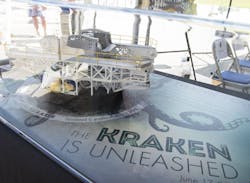NASA taps Metis to bring intelligence to flight deck technology that helps pilots manage complex scenarios
ALBUQUERQUE, N.M., - Metis Technology Solutions has received phase three funding from NASA Langley Research Center’s System-Wide Safety Office to advance its autonomous flight deck technology designed to aid pilots in managing complex scenarios.
The funding is part of NASA’s program to support small business innovation, which boosts the nation’s research and development capabilities and stimulates opportunities for successful commercialization. Under the NASA program, Metis developed the Intelligent Information Processing System (IIPS) which applies intelligent rules to exploit multiple data sources and provide best course of action recommendations. The software architecture is designed to analyze combined data for safety and situational relevance and apply priorities with an immediacy that can be quickly and intuitively processed by a flight crew.
In the near term, IIPS will be used in flight simulators and pilot training. With further development it also has a role in aerospace safety applications, and in support of autonomous vehicle operation.
For flight training, or real-world aerospace applications, when a situation becomes increasingly critical, IIPS prioritizes, filters, and presents information in a form that permits rapid assessment and action. If the expected action is not taken, information processing is continuously updated and modified until the situation is resolved.
Prototype implementations of IIPS have been tested at the Wright-Patterson Air Force Base Kraken flight simulator and at the Visual Imaging Simulator for Transport Aircraft Systems (VISTAS) laboratory at NASA Langley Research Center. At the VISTAS simulator, it was integrated with aircraft instrument simulations, and included data from eye movement tracking in a virtual cockpit.
“The goal of the phase three development is to make IIPS useful as an enhanced pilot training tool for commercial and military training programs,” said Richard Jessop, Metis IIPS Principal Investigator. “Future developments will include the use of Artificial Intelligence and ultimately, installation on commercial airliners and other flight or space vehicles as an effective precaution in breaking the kind of error chains that lead to failures and life-threatening disasters.”
